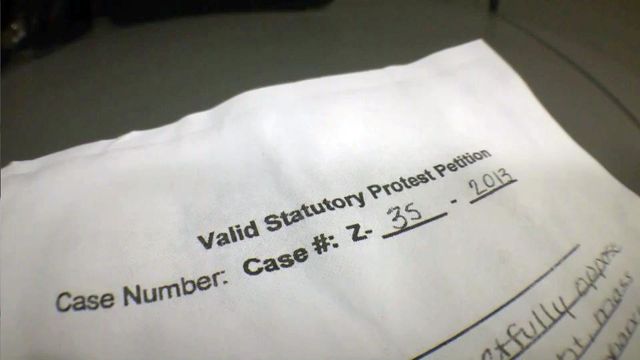Lawmakers push to eliminate tool used to fight new developments
Protest petitions allow neighbors of property that is to be rezoned to force city councils to approve the change in land use by a super-majority. Developers say they slow down economic development, but residents say they help protect property values.
Posted — Updated"We used the valid statutory protest petition because we did not find that the council or the planning commission would listen to us without some sort of clout," said Michi Vojta, a property owner and landlord who lives in Raleigh.
When property owners want to change the types of activities allowed on their land, they file for rezoning. In Vojta's example, Sheetz wanted to build a gas station on land that had been used for single-family homes.
A protest petition allows neighbors of the property to slow down that process. Such a petition requires either 20 percent of the individual owners surrounding the property or owners of 5 percent of the overall surrounding property. When such a petition is filed, it takes three-quarters of a city council to approve the change rather than a simple majority.
"I cannot think of a real reason why it should take more of a majority to pass a zoning change than for us to approve a constitutional amendment," Rep. Paul "Skip" Stam, R-Wake, told the committee Thursday.
If his bill were to pass, land use decisions would require a simple majority to pass, the same as tax increases and most other council decisions.
Protest petitions can come into play for projects both large and small. In Raleigh, they can affect a number of high-profile cases, such as the recent showdown over a retail center on Falls of Neuse Road or larger residential developments.
Rep. Stephen Ross, R-Alamance, said that he had encountered protest petitions when he served on the Burlington City Council and had seen people lose development deals because of how slow the process became. Developers and land owners, he said, should not have otherwise legal projects derailed just because neighbors objected.
"It was almost like a nuisance," Ross said.
But Vojta said there were more interests at stake than just the developers.
"I don't own that big (plot) of land, but I do own land next to it that would be damaged dramatically but insensitive development," she said.
The protest petition, she said, helped prod developers in the same area to engage the neighborhood earlier in the process.
Real estate interests support the measure
Richard Beard, a developer with Simpson Schulman & Beard and a representative of NAIOP, which represents commercial real estate developers, told the committee that developers back the legislation.
Stam's bill was needed, Beard said, "due to the unfair governmental power (state law) bestows to a very small minority, persons neither elected to a governmental body or appointed by a governmental body."
Protest petitions, he said, allow private individuals to have too much say over how a private landowner uses his or her property.
"Such power in the hands of unelected citizens is without precedent," he said.
Representatives of the North Carolina Home Builders Association and the North Carolina Apartments Association said they also backed the bill.
Rose Vaughn Williams, a lobbyist for the North Carolina League of Municipalities, said city officials throughout the state were split on the measure and urged lawmakers to adopt a compromise.
Rep. Paul Luebke, D-Durham, offered an amendment to change Stam's bill so that more neighbors would have to sign a protest petition in order for it to take effect and lower the super-majority needed to pass a controversial rezoning to two-thirds of the council members.
"This feature, the protest petition, helps the neighborhoods," Luebke said, urging colleagues not to do away with it entirely.
Committee Chairman Rep. Carl Ford called for a voice vote on the amendment. To many observers in the room, it sounded like the amendment had passed, but Ford said the amendment had been rejected. He made that call final before Luebke could call for a show of hands.
"I must need to get my hearing checked," quipped one Republican member on the way out of the room, implying that Ford had made the wrong call.
After the meeting, Ford, R-Rowan, said he would have let Luebke call for division if he had done so before a result was announced.
After that amendment failed, the bill passed the committee easily and is headed to the House floor.
That result disappoints Vojta and others who say ordinary citizens will lose clout when big developments are proposed for their neighborhoods.
"I just want the NC Legislature, and by extension the City Councils, to protect the rights and livelihoods of people who live in North Carolina, not just those who develop and entice folks to move here," she wrote in an email after committee ended.
Related Topics
• Credits
Copyright 2024 by Capitol Broadcasting Company. All rights reserved. This material may not be published, broadcast, rewritten or redistributed.






